Things We Lost in the Fire
 for drug content and language.
for drug content and language.
Reviewed by: Taran Gingery
CONTRIBUTOR
| Moral Rating: | Offensive |
| Moviemaking Quality: |
|
| Primary Audience: | Adults |
| Genre: | Drama |
| Length: | 1 hr. 59 min. |
| Year of Release: | 2007 |
| USA Release: |
October 19, 2007 (wide—1,000 theaters) |

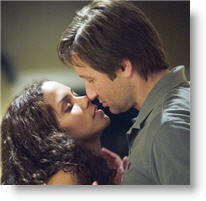

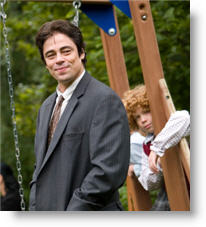

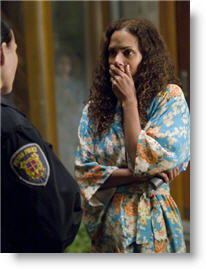
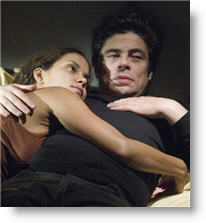
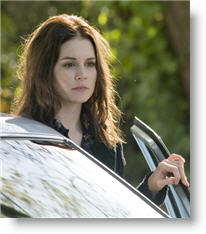




What should a Christian do if overwhelmed with depression? Answer
Is inter-ethnic marriage biblical?

| Featuring |
|---|
| Halle Berry, Benicio Del Toro, David Duchovny, Alison Lohman |
| Director |
|
Susanne Bier |
| Producer |
| Pippa Harris, Barbara Kelly, Jeremy Kramer, Allan Loeb, Sam Mendes, Sam Mercer, Mark Sourian |
| Distributor |
“Hope comes with letting go.”
The Burkes are a strong family. Sure, they have had their times of trial, but Steven Burke (David Duchovny) and his wife Audrey (Halle Berry) have always pulled the family through together. Indeed, it seems the only dark spot in their relationship is Jerry (Benicio Del Toro), Steven’s best friend, who happens to be a recovering heroin addict who can’t escape relapses. Audrey strongly disapproves of him, but Steven staunchly refused to give up on him.
Then one night, tragedy strikes and the Burkes are left without a husband and father. Lonely and torn by grief, Audrey invites Jerry to rent the refurbished garage, partly in order to make ends meet, but mostly because of Steven’s friendship with him. However, as the two cope with their losses and grow as people, they learn to understand and even help one another become better people.
There are so many positive messages in this film, it is hard to know where to start. Steven Burke is a kind, loving father and husband who has his faults, but his compassion for his friend and refusal to abandon him cannot be more emphasized. Indeed, it is because of his strong sense of right and wrong that he loses his life helping perfect strangers. The importance of the presence of a father and spending time with your children is stressed, as well as helping them overcome their fears. The value of human life is emphasized over material things.
Audrey Burke also loves her family very much, but is at first skeptical of Jerry and does not understand her husband’s loyalty to him. Later, as she comes to terms with Steven’s death, she becomes angry and even jealous of Jerry, when she perceives that he is assuming the father’s role in her children’s lives, but eventually she opens her heart and accepts him, while doing everything in her power to point him in the right direction.
Jerry is a kind, patient man whose several scenes with each of the children stand out the most to me, showing him to have a large heart and a strong understanding of people. His heroin addiction cannot be taken lightly, but neither is it shown as a positive thing. Jerry shows a strong need to lose his addiction, but finds he cannot do it on his strength alone. Only with Audrey’s help can he beat it back, a strong metaphor for how we cannot beat temptation without Christ’s help. Jerry describes the experience of using heroin as ‘touching the face of God’ (ironically and unfortunately, almost the only mention of God in the film) and says he still dreams about doing it, even when he is clean. Still, he must be noted for his strengths as well as his weaknesses.
Regarding language, several characters utter the f-word 9 or 10 times (most of them sexually) and the s-word that many or more, plus several milder profanities and misuse of God’s name. Steven and Audrey start to make out while standing (passionate kissing and groping), but are interrupted. I am most pleased to say that Audrey and Jerry do not sleep together, although they have many opportunities and a couple of scenes do have strong sensual tension, but nothing comes of it.
Jerry’s heroin use is seen in full and in an extremely powerful and moving series of scenes, Audrey finds him completely stoned, supports and half–carries him down a dirty street filled with other heroin addicts, and later is with him all the way through one of the most heart and gut-wrenching portrayals of going cold turkey that I have ever seen. As for violence, Steven is shot and killed by a man who was beating his wife ruthlessly while trying to rescue the woman, but no blood is scene.
That said, this is possibly the most moving and strongest movie I’ve seen so far this year. Everything about it is strong, from the script to the music. Berry shows what she can do when given the right material, Del Toro is powerfully and profoundly effective and Duchovny impresses in his short-lived role. Special mention should go to Alison Lohman as a fellow recovering heroin addict, Alexis Llewellyn as daughter Harper and Micah Berry as son Dory, all of whom shine in their roles. The R-rating should be taken seriously due to drug and language content, and the lack of complete redemption for the characters may leave some with an empty feeling, but I still recommend this film to discerning adults, for the positive messages and strong characters don’t all go up in smoke in “Things We Lost in the Fire.”
Violence: Moderate / Profanity: Heavy / Sex/Nudity: Moderate
See list of Relevant Issues—questions-and-answers.


I thought the movie was okay… it does have some good messages. I just wish I could’ve made a more informed decision. …
Moral rating: Offensive / Moviemaking quality: 4





This story is about people who do not like one another, or do not understand one another. They have lost the one person in life who keeps them together and who from worldly views seems to be the better part of all of them. When he is gone, one character reaches out to another to help them heal. Unfortunately, there is a lot of pain and agony that takes place in this journey. The self-destructive character (Del Toro) is the catalyst for the restoration and healing of the other’s grief and sometimes comes up short and abused because of that. Some ancillary characters invest time in him though and they help him restore his life. This is a touching and sometimes comical thing. It is a convincing story of pain, loss and restoration. Unfortunately, redemption is not necessarily achieved. “Accept the good,” is the lesson the film leaves you with.
As far as offensive elements, there is some language and there is an impure element to the marriage relationship, in which the husband toys with erotic fantasies to keep the spark, so to speak, in their marriage. This was offensive and probably not necessary. I would recommend this film to mature audiences only (which seems to have been all that was at the theatre at the time).
My Ratings: Average / 3½